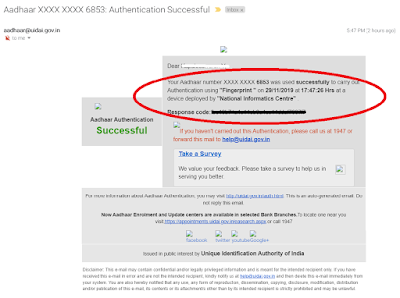After I opened my first bank account in 1976, I was happy and relieved that I have created a safe place for parking my savings and also deposited my then precious savings of Rs 5/- as opening cash ! Till recently I was peaceful and happy under the impression that my bank account is completely in my control under the watchful eyes of the bank and that no one else can operate the same.
But the thoughts were slightly rattled when the banks started diversifying their interest and focus away from personal banking and debited arbitrarily an amount, though small, from all bank accounts, without any explicit permission from or notice to the customers. Having blatantly trespassed into the bank accounts of the ignorant customers, banks swam through crores of rupees through the sheer number of accounts they could wade into. It was a different matter that those handful of customers who raised a flag were initially ignored and then the unauthorized debit silently reversed after they approached the Ombudsman was neither reported nor noticed by the hapless public, as it was in an era prior to digital and electronic reach.
Almost at the same time or slightly before when I was driving a team creating a banking product for customers across the globe on behalf of an IT major, I raised an eyebrow on the flow of credits into an account but then as a typical customer I failed to follow up on this potential quicksand.
Sometime back, a private bank customer was inadvertently credited with a huge amount, which he also withdrew and the bank had a tough time recovering the lost money and its face.
More recently UCO bank was reported to have credited some of their Kolkata based customers with amount totaling a whooping 820 crores, reportedly due to a 'technical glitch' , majority(!) of which are reported to be recovered {Read report here: https://www.mypunepulse.com/uco-bank-technical-glitch-important-steps-of-dos-and-donts-for-banks-and-customers/ }
The news report has also added that ' . . . caused major apprehension about the security of their accounts and what the customers should do to prevent such activities...'
This brings us to a question that has so far been treated as irrelevant "Does the bank has the authority to not only debit but also credit my account without my consent" ?
In case of periodical credits like deposits interest, the customer normally authorizes the same through the deposit opening formalities.
In case of debits like safe deposit locker rent and other charges like minimum balance too customer consent is obtained, but what about other transactions from any source , be it from within or outside the bank?
Does not the bank , as the guardian of our account, hold the responsibility of preventing unauthorized transactions from anyone ?
Though fictional, the case of a miscreant pumping credits into his adversary's account, calling the attention of tax authorities and bringing the innocent account holder's name into bad reputation , as detailed in Sydney Sheldon's fiction 'If Tomorrow Comes' comes immediately to my mind. With our bank accounts being digitally naked and exposed in the present era where our details are strewn across the web, it is not difficult for one to find the account number of anyone and do this just to tar the image of the receiver, who could be blissfully ignorant of the credits, atleast for some time !
But like the fence chewing the crop, how to prevent my own bank making unauthorized transactions into my account, is the question! If both bank and I are going to transact then who is the owner of 'my' account!
Now that many checks and balances are being provided to the customer to prevent unauthorized debits, can the customer also be allowed to set a 'Credit Transaction Limit', which shall be required even for the banks to make such credits ? Of course same technology could be used to obtain permission for standard transaction like periodical interest to deposit & savings account, locker rent, transactions charges etc.,
Like the saying of 'your freedom ends at the tip of my nose', where does the bank's freedom to access the customers' account ends?
Is it time for the Digital Banking stalwarts in banks to put on their thinking caps along with their legal counterparts and think differently?
Better it is done early , I feel, before they stare at some more complex scenarios aided by the emerging cybercrimes cornering them .
























